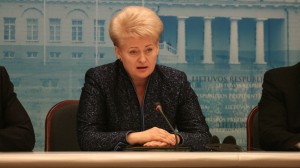VILNIUS — The Lithuanian government continued its house cleaning of employees allegedly involved in allowing the CIA to host a secret prison within the Baltic state’s borders.
President Dalia Grybauskaitė announced on Wednesday that she is recalling the ambassadorship of Mečys Laurinkus, currently serving as the Lithuanian ambassador to Georgia. Sources throughout the government said that Laurinkus’ dismissal — which has not yet taken affect — is because of his involvement in politics and its impediment on his performance as a diplomat.

Lithuanian President Dalia Grybauskaitė said at Wednesday's press conference that the ambassador was dismissed for dabbling in "politics," while the prime minister and speaker of the Seimas suggested involvement in the CIA secret prison was behind the firing. Photo by Nathan Greenhalgh.
“I would like that Foreign Service diplomats not neglect that this is a diplomatic service. If the diplomat wants to dabble in politics, he should choose another profession,” President Grybauskaitė said at a press conference with presidents of Latvia and Estonia Wednesday. She did not elaborate further on any alleged misconduct by Laurinkus.
Prime Minister Andrius Kubilius and Speaker of the Seimas Irena Degutienė strongly suggested that alleged involvement in the secret CIA prisons prompted the dismissal.
This is the second political fall from grace this week stemming from the CIA prisons. A probe by a Seimas committee into the alleged site is expected to be released on December 22.
“His main problem was his time serving as the director of Security Service Department,” Virgis Valentinavičius, adviser to the Kubilius, told Baltic Reports. “There was a certain culture where decisions were taken on their own.”
Arvydas Anušauskas, chairman of the committee on national security and defense and parliament member leading the investigation into the CIA sites, said in an email to Baltic Reports that “Mr. Laurinkus was interviewed as the former head of the Department on State Security. The findings will be made public after the investigation is concluded.”
In 2003, Laurinkus, while serving as the director of State Security Department, allegedly counseled then-President Rolandas Paksas about establishing the CIA black sites, where prisoners would be imported from the Bagram, Afghanistan for interrogation.
Valentinavičius said that Kubilius was made aware of the president’s reasons for dismissal this afternoon. “The president herself announced that Mr. Laurinkus is too much involved with politics,” Valentinavičius said. “Lithuania needs professional diplomat in the embassies. The prime minister respects the president’s take on Mr. Laurinkus.”
When asked if the president’s mentioning of “politics” meant Laurinkus’ involvement in the CIA prisons, Valentinavičius said: “considering the circumstances, the prime minister agrees it might be the reason.”
When asked if there were other incidents that could have spurred his dismissal, Valentinavičius said “It is not very good to get into further speculations.”
Linas Balsys, spokesman for the president, told Baltic Reports that, “the president restrains comment on specific dates and instances.”
Balsys denied early press reports saying that this was an overnight decision. He said that discussions between the president and Vygaudas Ušackas, the minister of foreign affairs, over Laurinkus’ job “have been ongoing for months.”
Balsys also declined to comment on whether or not this was related to the probe, saying “it is not that simple or easy.”
Ušackas is out of the country and his office declined to add additional comment.
Grybauskaitė is currently in the process of removing Laurinkus from his position, but had not announced anything until Lithuanian media broke the story. Because the process had not been completed, Balsys said, she had not been able to consult with the Georgian government about reassigning someone else for the position.
Laurinkus’ dismissal comes less than a week after elections were held in the disputed Georgian region of Abkhazia, and just two days after European Union and United States officials refused to recognize as legitimate the ballot results or claims to sovereignty. Lithuanian officials interviewed said that any events occurring within the country had no effect on Grybauskaitė’s decision, and Akaki Dvali, senior consul at the Georgian embassy in Lithuania, said that Laurinkus’ removal would have no bearing on Lithuanian-Georgian relations.
Balsys said that it is still too early in the process for Grybauskaitė to have picked a successor, but she is still following governmental procedures for Laurinkus’ ouster and will try and find one soon. He added that relations with Georgia remain a priority for the President.
“Lithuania is keeping the same standpoint as the European Union” regarding Abkhazia, Balsys said.
In November, the Grybauskaitė met with the chairman of Georgia’s parliament and advocated for the country’s inclusion in the EU, and welcomed their inclusion in the EU’s Eastern Partnership, a trade organization of post-Soviet states. Grybauskaitė has met with Georgian President Mikheil Saakashvili twice in the last six months, the last time at the United Nations General Assembly in September.
“It was a nice, good chat, they were pretty friendly, and she said she supports the georgian people,” Balsys said of the last meeting between the two heads of state. “If Lithuania can help, with its own experience dealing with the EU or NATO, we can keep on doing things together.”
— Baltic Reports editor Nathan Greenhalgh contributed to this article.












